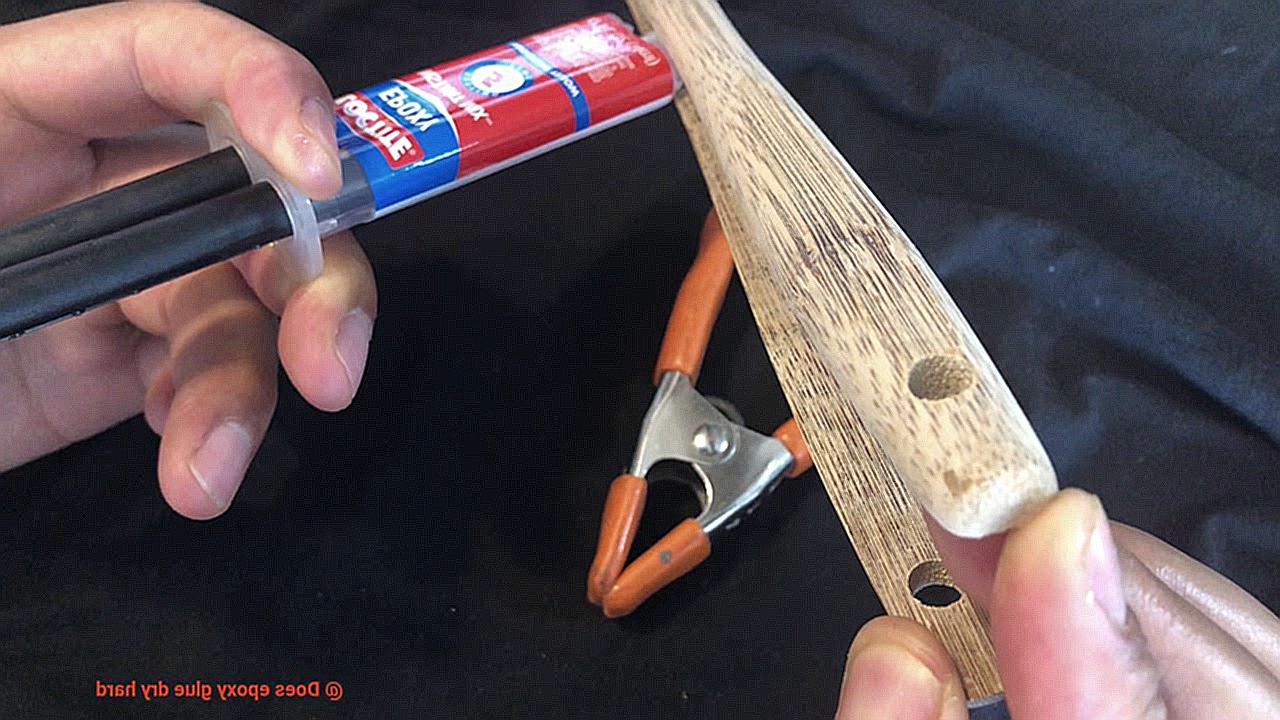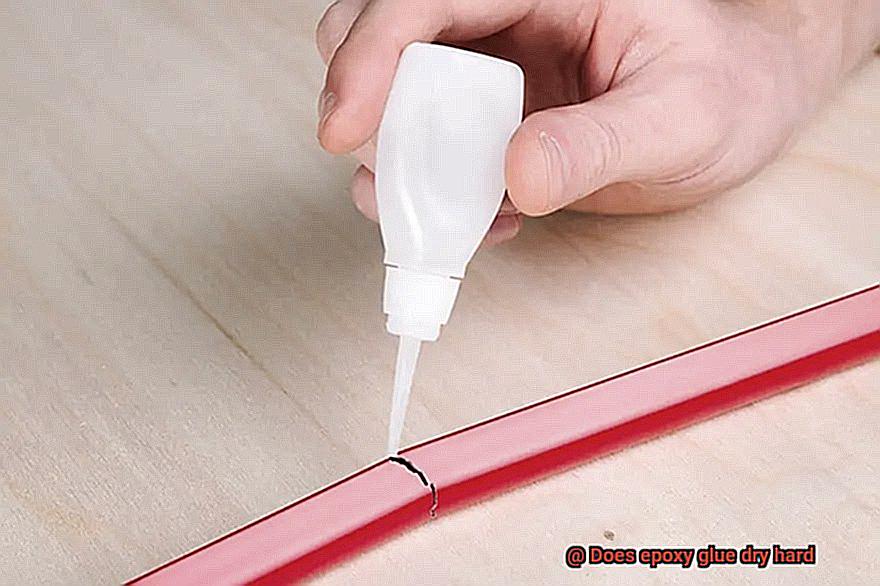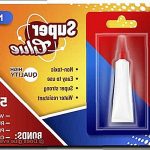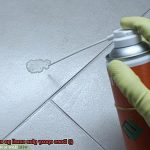Are you tired of glues that just don’t seem to hold up? Maybe you’ve tried everything from the basic white glue to the super-strong cyanoacrylate, but nothing seems to work. That’s where epoxy glue comes in – a versatile adhesive that can bond almost anything together. But does it dry hard? That’s the question on everyone’s mind.
Epoxy glue is a two-part adhesive made by mixing resin and hardener, which then undergoes a chemical reaction that results in a strong and durable bond. Its defining feature is its ability to cure and harden, making it one of the toughest adhesives available. With amazing physical and mechanical properties, this adhesive is perfect for long-term bonding and strength.
In this blog post, we’ll take a closer look at whether epoxy glue dries hard or not, as well as explore its various applications. We’ll also discuss why it’s better than other types of adhesives and what limitations it has. So if you’re curious about whether your latest epoxy project will stand the test of time, keep reading to learn more about how epoxy glue dries and why many professionals choose it over other options.
How Does Epoxy Glue Work?
Contents
- 1 How Does Epoxy Glue Work?
- 2 The Strength and Durability of Epoxy Glue
- 3 Hardness of Epoxy Glue
- 4 Factors Affecting the Hardness of Epoxy Glue
- 5 Environmental Factors and Resistance to Epoxy Glue
- 6 Benefits of Using Epoxy Glue
- 7 Common Uses for Epoxy Glue
- 8 Tips for Using and Storing Epoxy Glue
- 9 Conclusion
Epoxy glue is a powerful adhesive that has become a staple in many industries, from construction to automotive repair to woodworking. Its strength, versatility, and resistance to environmental factors make it an essential tool for bonding materials together. But how exactly does epoxy glue work to create such a strong bond?
At its core, epoxy glue is a two-part adhesive consisting of a resin and a hardener. When these two components are mixed together, they initiate a chemical reaction that results in the hardening of the adhesive and the creation of a strong and durable bond. This reaction can take anywhere from a few minutes to several hours, depending on the specific type of epoxy and environmental conditions such as temperature and humidity.
The hardening process is crucial for the adhesive to create a strong bond between two surfaces. Once the epoxy glue has fully cured, it dries hard and forms a bond that can withstand heavy loads and stress. This cured product is resistant to water, chemicals, and heat, making it ideal for use in harsh environments.
But epoxy glue’s versatility doesn’t end at its bonding strength. It can also be used as both an adhesive and a filler by adding fillers such as wood dust or metal powder to the mixture. This makes it possible to fill gaps or cracks in materials, further increasing its range of applications.
It’s important to note that not all types of epoxy glue are created equal. The hardness of epoxy glue can vary depending on factors such as the ratio of resin to hardener, curing temperature, and length of time allowed for curing. Some types will dry harder than others, depending on the specific formulation used.
The Strength and Durability of Epoxy Glue
Epoxy glue is a game-changer in the world of adhesives. Its remarkable strength and durability have made it a go-to for many different applications, from woodworking to metalworking and construction. This adhesive’s secret lies in its chemical composition – it consists of two parts, a resin and a hardener that, when mixed, create a powerful bond.
What sets epoxy glue apart is its ability to bond with almost any surface imaginable. It can bond wood, metal, plastic, and even glass, making it an extremely versatile adhesive. But what really makes it stand out is its exceptional strength. The high tensile strength of epoxy glue means that it can withstand intense stress without breaking or losing its grip. Whether you’re constructing a building or fixing a broken piece of metal, epoxy glue will provide an unyielding bond that lasts.
But epoxy glue’s strength isn’t its only selling point – its durability is equally impressive. Once cured, epoxy glue is impervious to water, chemicals, and heat. This means that it can withstand harsh conditions that would cause other adhesives to fail. For example, marine applications often use epoxy glue because it can withstand exposure to saltwater and other corrosive elements.
Hardness of Epoxy Glue
Epoxy glue is a remarkable adhesive, renowned for its exceptional strength and durability. It is highly versatile and can bond almost any surface, making it a superhero in the world of bonding materials. However, when it comes to the hardness of epoxy glue, several factors come into play.
The curing process of epoxy glue involves a chemical reaction between the resin and hardener that results in a solid, rigid, and durable bond. The hardness of cured epoxy glue depends on various factors, including the ratio of resin and hardener used, the curing time, and environmental factors.
The ratio of resin and hardener used is crucial in determining the hardness of cured epoxy glue. A higher concentration of hardener used will result in a harder bond. However, too much hardener can lead to a brittle bond that may crack or break under stress. Therefore, it is essential to follow the manufacturer’s instructions for mixing the correct ratio of both components.
Curing time also plays a significant role in the hardness of epoxy glue. Different types and brands of epoxy glue can take varying amounts of time to cure fully. Following the recommended curing time provided by the manufacturer ensures optimum hardness and durability.
Environmental factors such as humidity and temperature can affect the curing process and ultimately impact the hardness of cured epoxy glue. High humidity levels can slow down the curing process, while low humidity levels can speed it up. Similarly, low temperatures can slow down curing times, while high temperatures can speed it up. To ensure optimum results, it is best to cure epoxy in a controlled environment with moderate temperature and humidity levels.
Factors Affecting the Hardness of Epoxy Glue
Epoxy glue is a versatile and strong adhesive that is used in a wide range of applications. However, to achieve the desired level of hardness in an epoxy adhesive, it’s crucial to understand the various factors that can affect it. As an expert in this field, let me take you through the factors that play a critical role in determining the hardness of epoxy glue.
The first and most critical factor that affects the hardness of epoxy glue is the ratio of resin to hardener. Proper mixing of these components in the correct proportions is essential to ensure optimal curing and bonding strength. A slight variation in the mixing ratio can significantly affect the adhesive’s hardness and durability.
Temperature is another critical factor that affects the hardness of epoxy glue. Curing at higher temperatures can speed up the process, but curing at too high a temperature can make the adhesive brittle. Therefore, it’s essential to follow the manufacturer’s recommendations for curing temperature to achieve optimal bonding strength and hardness.
The type of hardener used also plays a crucial role in determining the hardness of epoxy glue. Some hardeners produce a more rigid bond, while others provide a more flexible bond. Choosing the right type of hardener is essential to achieve the desired level of hardness.
Surface preparation is another critical factor in achieving optimal bonding strength and hardness. The surfaces being bonded must be clean, dry, and free from oil, grease, or other contaminants. Proper surface preparation can significantly improve the adhesive’s bonding strength and hardness.
In addition to these factors, other variables such as humidity, pressure, and curing time can also affect the hardness of epoxy glue. Understanding these factors’ impact on the adhesive’s hardness is crucial for achieving optimal bonding strength and durability.
In summary, achieving exceptional bonding strength and hardness in epoxy glue requires taking into account several critical factors. By following manufacturer recommendations and best practices for using epoxy glue, users can achieve optimal bonding strength and durability for their applications. To summarize, the critical factors affecting the hardness of epoxy glue are:
- Proper mixing ratio of resin and hardener
- Correct curing temperature
- The type of hardener used
- Proper surface preparation
- Other variables like humidity, pressure, and curing time
Environmental Factors and Resistance to Epoxy Glue
If you are, then you’ve probably heard of epoxy glue, a mighty adhesive that can bond almost any surface. However, did you know that environmental factors play a significant role in its performance? As an expert in this field, let me take you on a journey to understand how temperature, humidity, and surface type can impact the drying and hardening of epoxy glue.

Temperature is a crucial factor when it comes to using epoxy glue. The ideal temperature range for epoxy glue to dry and cure correctly is between 60°F and 90°F. If the temperature is too low, the glue may not harden correctly, resulting in a weak bond. Conversely, if the temperature is too high, the glue may harden too quickly, making it difficult to work with and affecting its strength. Therefore, it’s essential to ensure that the temperature is just right for optimal performance.
Humidity is another critical environmental factor that can impact how well epoxy glue dries. High humidity levels can interfere with the chemical reaction that occurs during curing, making it difficult for the glue to dry correctly. In extremely humid conditions, using a dehumidifier or air conditioning may be necessary to create an optimal environment for epoxy glue to cure.
The type of surface being bonded is also crucial when it comes to how well epoxy glue will adhere and harden. Some surfaces require special preparation before applying epoxy glue to ensure proper adhesion. Metals, for instance, need thorough cleaning before applying epoxy glue to ensure maximum adhesion. Additionally, some materials may expand or contract in response to changes in temperature, causing stress on the bond created by epoxy glue.
Now that we’ve discussed environmental factors’ impact on the drying and hardening of epoxy glue let’s focus on its resistance once it has dried. Epoxy glue is generally quite resistant to water, chemicals, and extreme temperatures once it has fully cured. However, it’s essential to note that prolonged exposure to extreme heat or cold can cause the bond to weaken over time. Additionally, exposure to UV light can cause yellowing or degradation over time.
In summary, to ensure optimal performance and longevity of the bond created by epoxy glue, it’s crucial to consider environmental factors before using it. Paying attention to the temperature, humidity, and surface type can help you achieve the best results. To make it easier for you, here’s a quick checklist:
Benefits of Using Epoxy Glue
Epoxy glue is a popular adhesive used for a variety of applications due to its ability to provide strong and durable bonds. As an expert in the field of epoxy glue, I have seen firsthand the many benefits of using this type of adhesive. Here are some reasons why you should consider using epoxy glue:
Firstly, epoxy glue is known for its ability to create strong and durable bonds that can withstand heavy loads, shocks, and vibrations. It can bond to a wide range of surfaces, including metal, wood, plastic, and ceramic. This strength and durability make it ideal for use in construction, automotive, and aerospace industries where reliability is essential.
Another key benefit of using epoxy glue is its water-resistant properties. This means that it can be used in wet environments without losing its bonding strength. It’s also resistant to chemicals and heat, making it ideal for use in harsh environments.
Epoxy glue is also easy to use as it comes in two separate components – the resin and the hardener. These two components need to be mixed together in equal parts before application. The mixture has a long working time, allowing users to adjust and position the materials before the glue sets. This feature makes it ideal for filling gaps or sealing joints.
The versatility of epoxy glue is yet another benefit. It can be used for a wide range of applications such as bonding, sealing, and filling gaps. This versatility makes it an attractive choice for various industries such as automotive, construction, aerospace, and marine.
While some may initially view epoxy glue as expensive compared to other adhesives on the market, it’s cost-effective in the long run due to its durability and strength. It reduces the need for frequent repairs or replacements, which can save money over time.
Common Uses for Epoxy Glue
If you’re on the hunt for a powerful and long-lasting adhesive that can bond almost any material, look no further than epoxy glue. As an expert in this field, I can tell you that it’s a versatile adhesive that’s commonly used across various industries.
Construction professionals rely on epoxy glue to join concrete blocks, fix cracks and holes in floors, and reinforce structures. Woodworkers use it to join pieces of wood together, fill gaps and holes, and create durable finishes. It’s also a go-to adhesive in the automotive industry for repairing bodywork, fixing mechanical components, and sealing leaks in radiators and gas tanks due to its resistance to gasoline and other chemicals.
But its uses don’t stop there. The marine industry also depends on the strength of epoxy glue to repair boats, seal hulls, and attach hardware. And if you’re a DIY enthusiast, you’ll find endless possibilities with epoxy glue for jewelry making, pottery, sculpture, and other projects where a strong bond is essential.
What makes epoxy glue stand out from other adhesives is its ability to dry hard, providing a strong and durable bond that can withstand heavy loads and extreme conditions. Its versatility to bond almost any material also makes it cost-effective in the long run.
Tips for Using and Storing Epoxy Glue
Epoxy glue is a versatile adhesive that can bond almost anything, from metal to glass. However, to ensure that it creates strong and long-lasting bonds, it’s essential to use and store it correctly. Here are some tips that will help you get the most out of your epoxy glue.
Protect Yourself
When handling epoxy glue, always wear protective gear like gloves and eye protection. The chemicals in the glue can cause irritation or harm to your skin or eyes if they come into contact with them.
Mix Thoroughly
To create a strong bond between the materials you want to join, it’s essential to mix the two components of the epoxy glue thoroughly. Use equal parts of the resin and hardener components in a clean container and stir for at least two minutes until the mixture is completely blended.
Clean the Surface
For optimal bonding, ensure that the surfaces you want to bond are clean and dry before applying the epoxy glue. Any dirt, grease, or moisture on the surface can weaken the bond and reduce the effectiveness of the glue. Clean the surfaces with a degreaser or rubbing alcohol before applying the glue.
Clamp if Necessary
If you’re bonding two large or heavy objects together, use clamps to hold them in place until the glue cures completely. This will prevent excess glue from squeezing out and weakening the bond.
Store Correctly
Epoxy glue has a limited shelf life, usually between six months to a year depending on the brand and formulation. To extend its lifespan, store it in a cool, dry place away from direct sunlight and heat sources. Also, keep the containers tightly sealed to prevent air from entering and potentially affecting the chemical composition of the glue.
DpDKTqnesMI” >
Conclusion
In summary, epoxy glue is a force to be reckoned with when it comes to adhesives. Its standout feature is its ability to cure and harden, resulting in one of the most robust bonding agents available. The secret behind its strength lies in the chemical reaction that occurs when resin and hardener are mixed together.
The curing process can be influenced by various factors such as temperature, humidity, and the ratio of resin and hardener used. But once cured, epoxy glue proves itself as an ideal solution for long-term bonding and filling gaps or cracks in materials.
Its versatility allows it to bond almost any material and makes it a go-to choice across industries like construction, woodworking, automotive repair, aerospace, and marine. However, to ensure optimal performance and longevity of the bond created by epoxy glue, environmental factors must be taken into account before use.
By following manufacturer recommendations and best practices for using epoxy glue users can achieve optimal bonding strength and durability for their applications.






